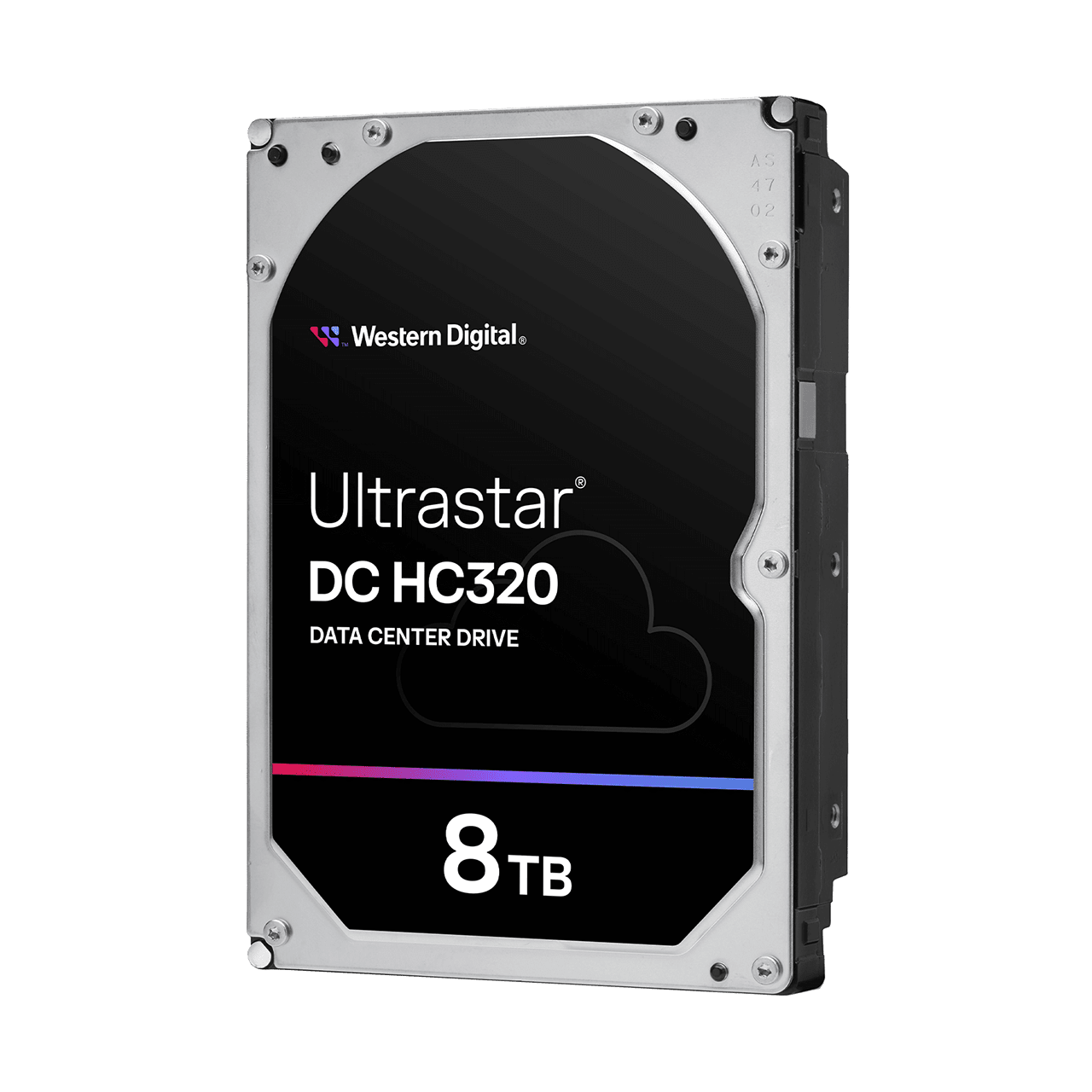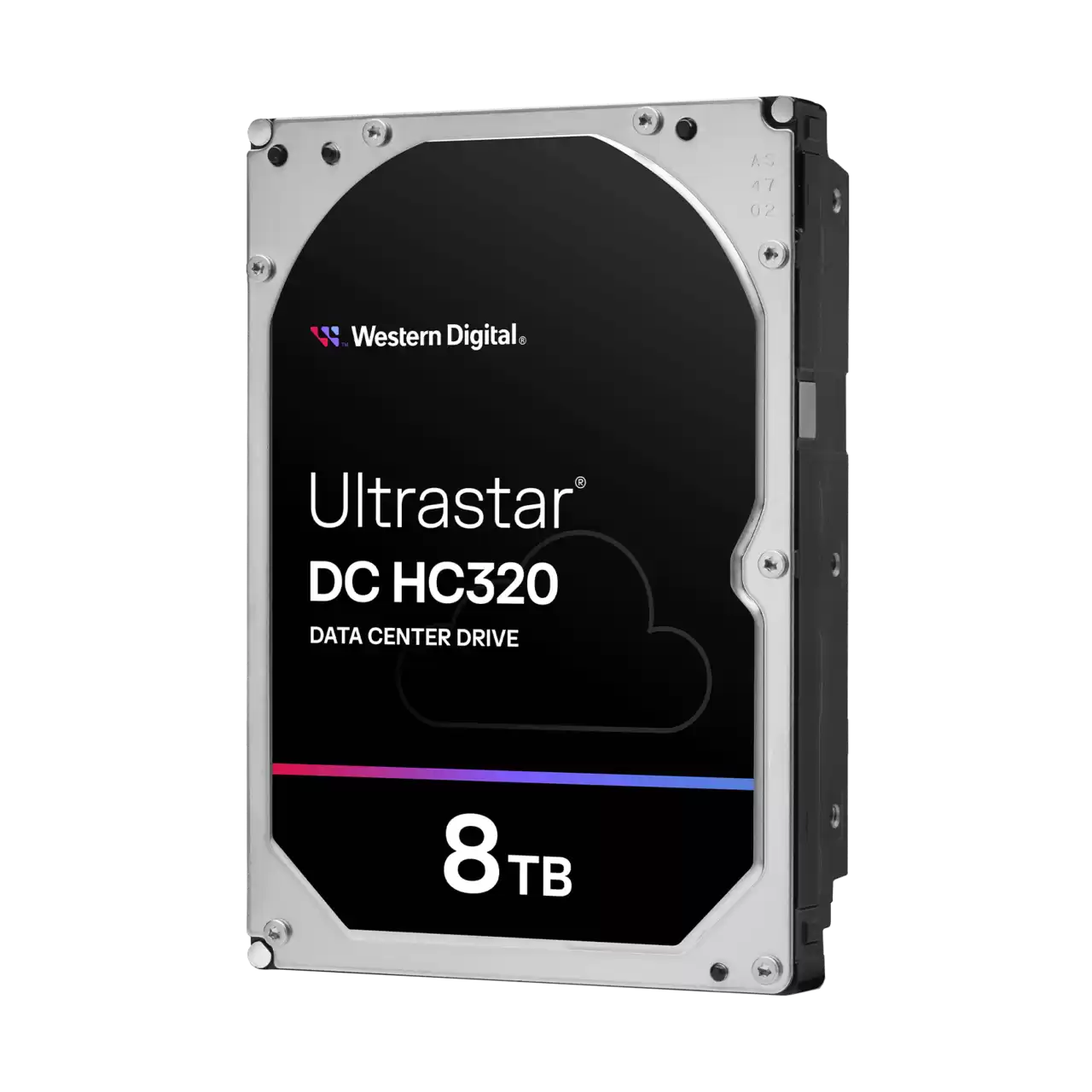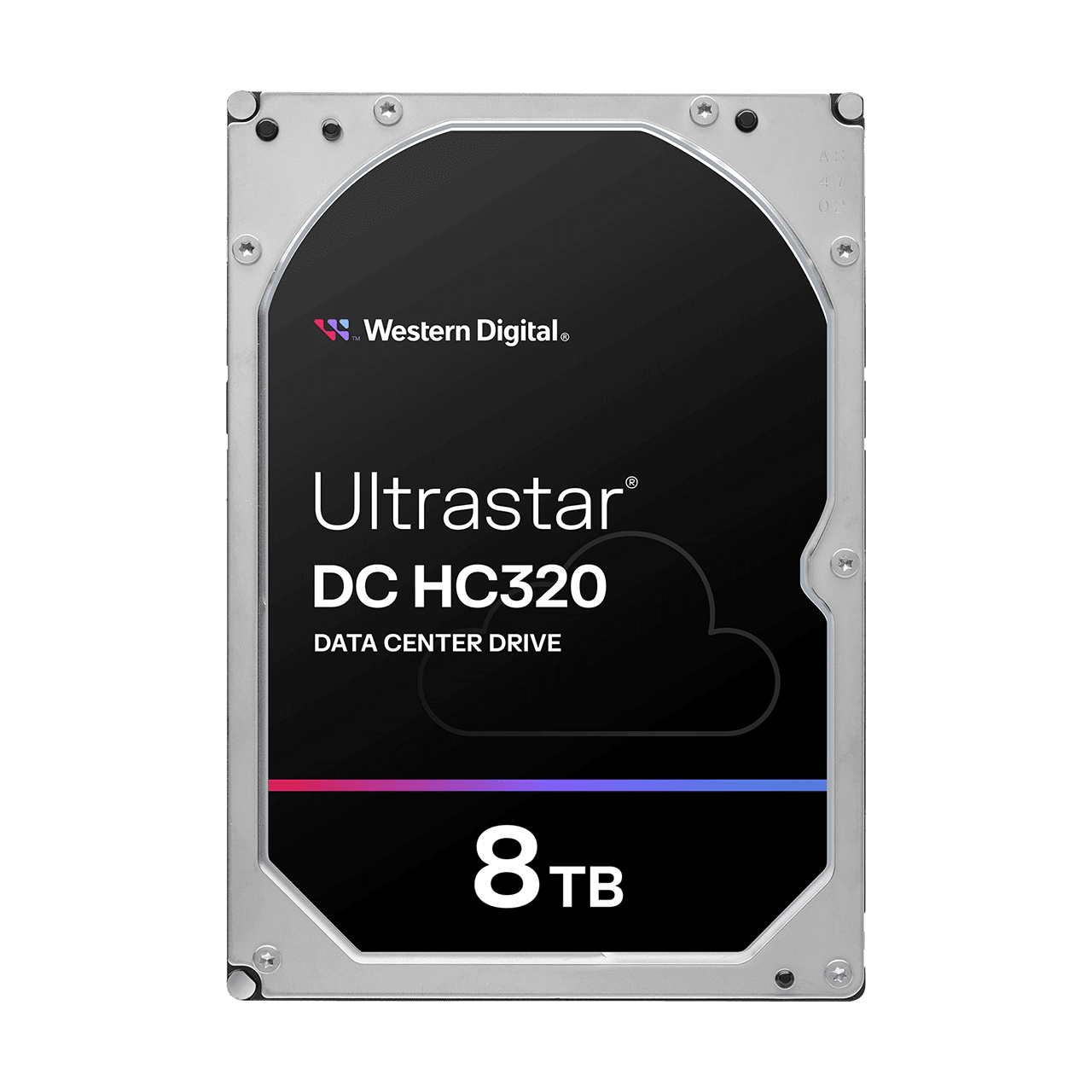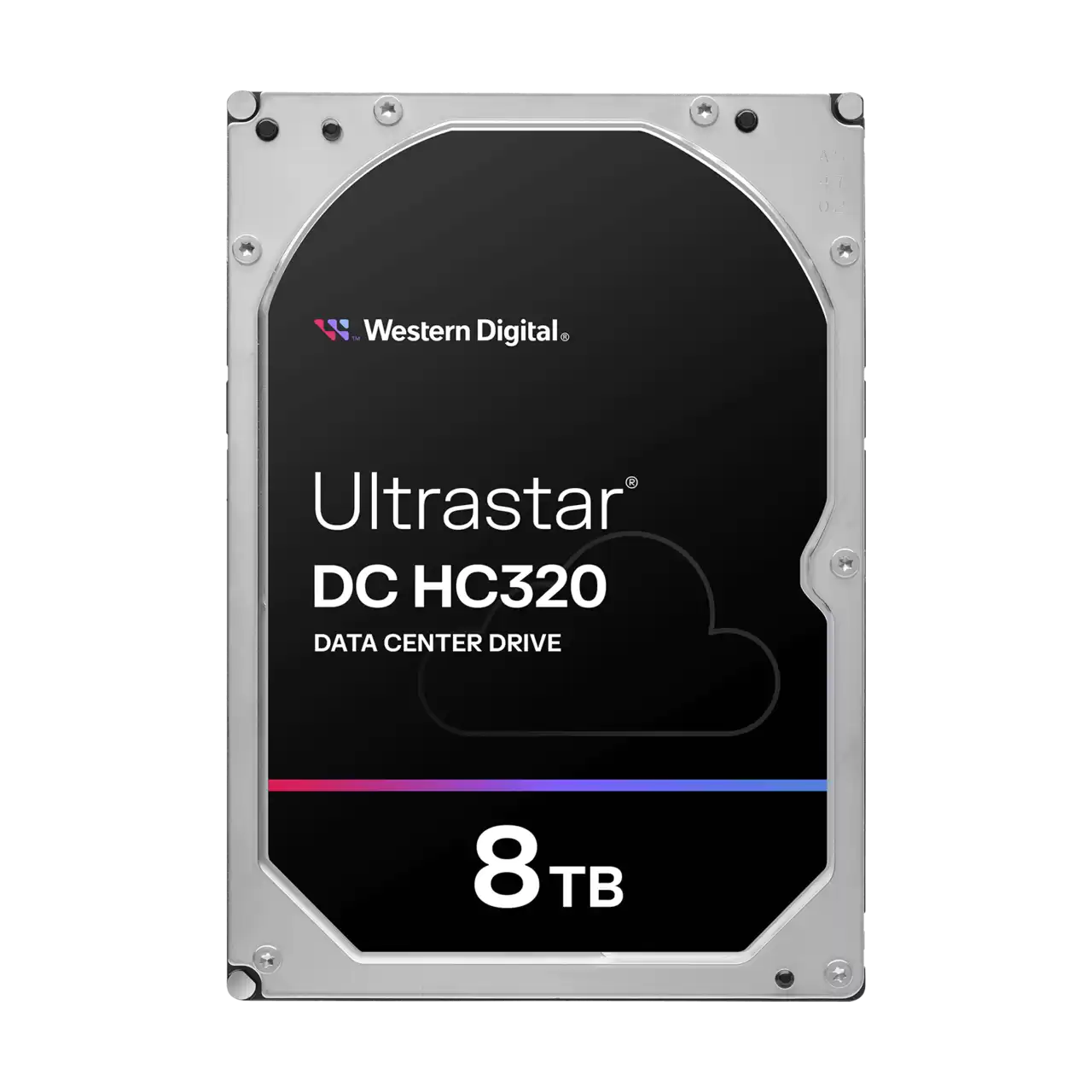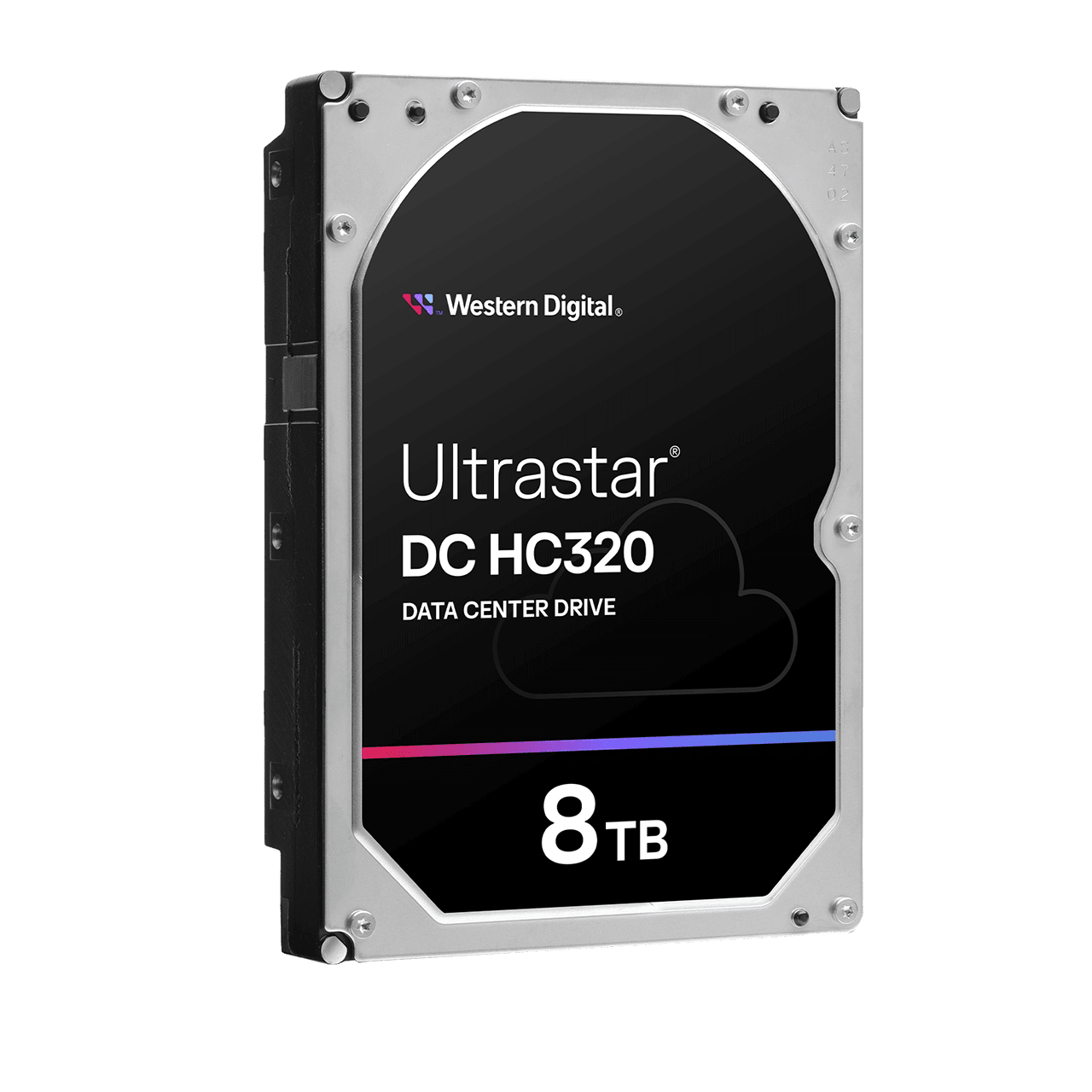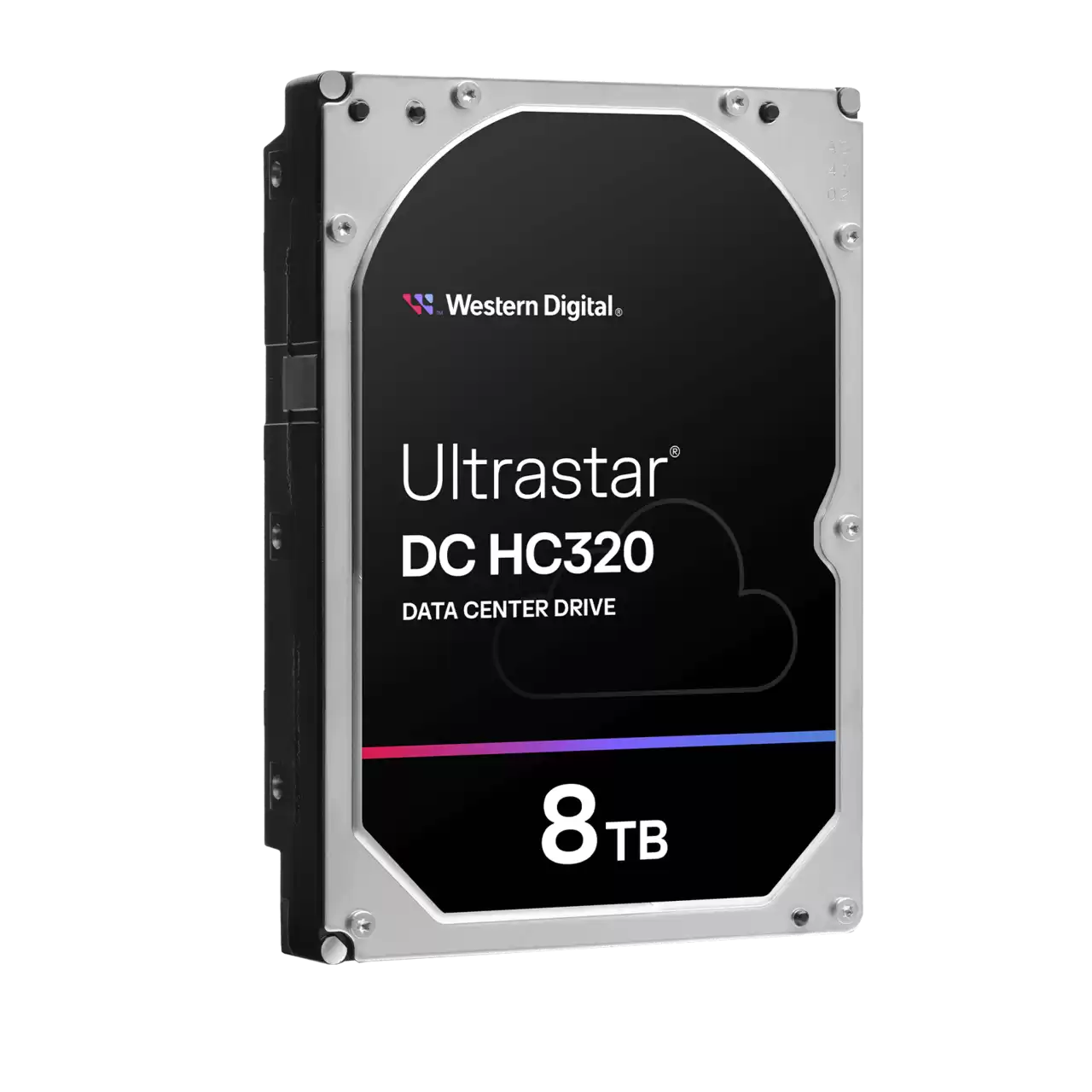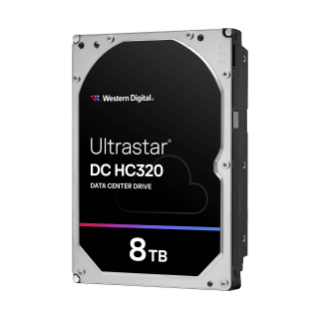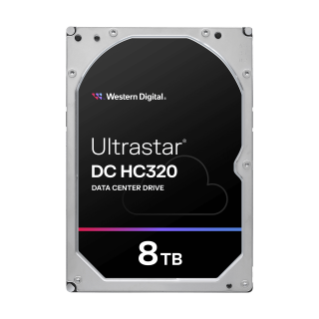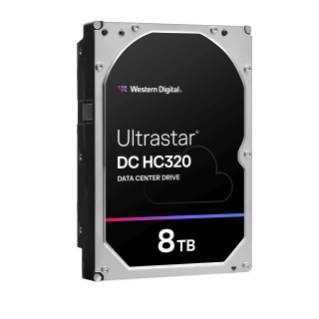Western Digital 8TB DC HC320 HDD. Bring mid-capacity drives to your data center
The Ultrastar DC HC300-series provides low to mid-capacity drives that are economical to acquire, yet deliver quick and reliable data access for traditional data center applications.
Western Digital 8TB DC HC320 HDD. Bring mid-capacity drives to your data center
The Ultrastar DC HC300-series provides low to mid-capacity drives that are economical to acquire, yet deliver quick and reliable data access for traditional data center applications.
Western Digital 8TB DC HC320 HDD. Bring mid-capacity drives to your data center
The Ultrastar DC HC300-series provides low to mid-capacity drives that are economical to acquire, yet deliver quick and reliable data access for traditional data center applications.
Western Digital 8TB DC HC320 HDD. Bring mid-capacity drives to your data center
The Ultrastar DC HC300-series provides low to mid-capacity drives that are economical to acquire, yet deliver quick and reliable data access for traditional data center applications.
Western Digital 8TB DC HC320 HDD. Bring mid-capacity drives to your data center
The Ultrastar DC HC300-series provides low to mid-capacity drives that are economical to acquire, yet deliver quick and reliable data access for traditional data center applications.
Economics and Access Speed: Key Requirements for Low Capacity SATA HDDs in the Data Center
As the industry evolves to develop purpose-built solutions for growing data storage requirements, IT managers continue to rely on lower capacity drives that are economical to acquire, yet deliver quick and reliable data access for traditional data center applications. Designed to handle workloads up to 550TB per year, Ultrastar® DC HC320 is an 8TB1 HDD that helps address economic and access requirements of many traditional IT workloads. Low capacity drives also help address architecture limitations. Part of our mid-capacity DC HC300 series, the Ultrastar DC HC320 is designed for traditional storage and server applications as well as distributed and scalable computing, including block and file storage architectures, providing fast 7,200 RPM performance and lower acquisition cost to help ease budget constraints. Ultrastar DC HC320 is offered with either 6Gb/s SATA or 12Gb/s SAS interface in a 512e9 format.
Technology Innovation Delivers Efficiency and Performance for Traditional IT Systems
Ultrastar DC HC320 is based on a proven 5-disk air platform design that uses conventional magnetic recording (CMR) technology in a 3.5-inch large form factor. Compared to the prior generation, Ultrastar 7K6000, the DC HC320 delivers 33% more capacity, up to 12% performance boost and uses slightly larger-diameter media. It features a second-generation, dual-stage micro actuator to enhance head positioning accuracy for better drive performance. Write performance gains are also supported by Western Digital’s media cache architecture, a disk-based caching technology that provides a large cache area on the disk, which also improves reliability and data integrity during unexpected power loss. Finally, the addition of flash-based nonvolatile cache (NVC) on both SATA and SAS models helps improve write performance. The Ultrastar DC HC320 also includes a Rebuild Assist feature, which helps dramatically reduce RAID rebuild times and maintain system performance during the rebuild process. Learn more in our Rebuild Assist technical brief.
Economics and Access Speed: Key Requirements for Low Capacity SATA HDDs in the Data Center
As the industry evolves to develop purpose-built solutions for growing data storage requirements, IT managers continue to rely on lower capacity drives that are economical to acquire, yet deliver quick and reliable data access for traditional data center applications. Designed to handle workloads up to 550TB per year, Ultrastar® DC HC320 is an 8TB1 HDD that helps address economic and access requirements of many traditional IT workloads. Low capacity drives also help address architecture limitations. Part of our mid-capacity DC HC300 series, the Ultrastar DC HC320 is designed for traditional storage and server applications as well as distributed and scalable computing, including block and file storage architectures, providing fast 7,200 RPM performance and lower acquisition cost to help ease budget constraints. Ultrastar DC HC320 is offered with either 6Gb/s SATA or 12Gb/s SAS interface in a 512e9 format.
Technology Innovation Delivers Efficiency and Performance for Traditional IT Systems
Ultrastar DC HC320 is based on a proven 5-disk air platform design that uses conventional magnetic recording (CMR) technology in a 3.5-inch large form factor. Compared to the prior generation, Ultrastar 7K6000, the DC HC320 delivers 33% more capacity, up to 12% performance boost and uses slightly larger-diameter media. It features a second-generation, dual-stage micro actuator to enhance head positioning accuracy for better drive performance. Write performance gains are also supported by Western Digital’s media cache architecture, a disk-based caching technology that provides a large cache area on the disk, which also improves reliability and data integrity during unexpected power loss. Finally, the addition of flash-based nonvolatile cache (NVC) on both SATA and SAS models helps improve write performance. The Ultrastar DC HC320 also includes a Rebuild Assist feature, which helps dramatically reduce RAID rebuild times and maintain system performance during the rebuild process. Learn more in our Rebuild Assist technical brief.
Economics and Access Speed: Key Requirements for Low Capacity SATA HDDs in the Data Center
As the industry evolves to develop purpose-built solutions for growing data storage requirements, IT managers continue to rely on lower capacity drives that are economical to acquire, yet deliver quick and reliable data access for traditional data center applications. Designed to handle workloads up to 550TB per year, Ultrastar® DC HC320 is an 8TB1 HDD that helps address economic and access requirements of many traditional IT workloads. Low capacity drives also help address architecture limitations. Part of our mid-capacity DC HC300 series, the Ultrastar DC HC320 is designed for traditional storage and server applications as well as distributed and scalable computing, including block and file storage architectures, providing fast 7,200 RPM performance and lower acquisition cost to help ease budget constraints. Ultrastar DC HC320 is offered with either 6Gb/s SATA or 12Gb/s SAS interface in a 512e9 format.
Technology Innovation Delivers Efficiency and Performance for Traditional IT Systems
Ultrastar DC HC320 is based on a proven 5-disk air platform design that uses conventional magnetic recording (CMR) technology in a 3.5-inch large form factor. Compared to the prior generation, Ultrastar 7K6000, the DC HC320 delivers 33% more capacity, up to 12% performance boost and uses slightly larger-diameter media. It features a second-generation, dual-stage micro actuator to enhance head positioning accuracy for better drive performance. Write performance gains are also supported by Western Digital’s media cache architecture, a disk-based caching technology that provides a large cache area on the disk, which also improves reliability and data integrity during unexpected power loss. Finally, the addition of flash-based nonvolatile cache (NVC) on both SATA and SAS models helps improve write performance. The Ultrastar DC HC320 also includes a Rebuild Assist feature, which helps dramatically reduce RAID rebuild times and maintain system performance during the rebuild process. Learn more in our Rebuild Assist technical brief.
Economics and Access Speed: Key Requirements for Low Capacity SATA HDDs in the Data Center
As the industry evolves to develop purpose-built solutions for growing data storage requirements, IT managers continue to rely on lower capacity drives that are economical to acquire, yet deliver quick and reliable data access for traditional data center applications. Designed to handle workloads up to 550TB per year, Ultrastar® DC HC320 is an 8TB1 HDD that helps address economic and access requirements of many traditional IT workloads. Low capacity drives also help address architecture limitations. Part of our mid-capacity DC HC300 series, the Ultrastar DC HC320 is designed for traditional storage and server applications as well as distributed and scalable computing, including block and file storage architectures, providing fast 7,200 RPM performance and lower acquisition cost to help ease budget constraints. Ultrastar DC HC320 is offered with either 6Gb/s SATA or 12Gb/s SAS interface in a 512e9 format.
Technology Innovation Delivers Efficiency and Performance for Traditional IT Systems
Ultrastar DC HC320 is based on a proven 5-disk air platform design that uses conventional magnetic recording (CMR) technology in a 3.5-inch large form factor. Compared to the prior generation, Ultrastar 7K6000, the DC HC320 delivers 33% more capacity, up to 12% performance boost and uses slightly larger-diameter media. It features a second-generation, dual-stage micro actuator to enhance head positioning accuracy for better drive performance. Write performance gains are also supported by Western Digital’s media cache architecture, a disk-based caching technology that provides a large cache area on the disk, which also improves reliability and data integrity during unexpected power loss. Finally, the addition of flash-based nonvolatile cache (NVC) on both SATA and SAS models helps improve write performance. The Ultrastar DC HC320 also includes a Rebuild Assist feature, which helps dramatically reduce RAID rebuild times and maintain system performance during the rebuild process. Learn more in our Rebuild Assist technical brief.
Economics and Access Speed: Key Requirements for Low Capacity SATA HDDs in the Data Center
As the industry evolves to develop purpose-built solutions for growing data storage requirements, IT managers continue to rely on lower capacity drives that are economical to acquire, yet deliver quick and reliable data access for traditional data center applications. Designed to handle workloads up to 550TB per year, Ultrastar® DC HC320 is an 8TB1 HDD that helps address economic and access requirements of many traditional IT workloads. Low capacity drives also help address architecture limitations. Part of our mid-capacity DC HC300 series, the Ultrastar DC HC320 is designed for traditional storage and server applications as well as distributed and scalable computing, including block and file storage architectures, providing fast 7,200 RPM performance and lower acquisition cost to help ease budget constraints. Ultrastar DC HC320 is offered with either 6Gb/s SATA or 12Gb/s SAS interface in a 512e9 format.
Technology Innovation Delivers Efficiency and Performance for Traditional IT Systems
Ultrastar DC HC320 is based on a proven 5-disk air platform design that uses conventional magnetic recording (CMR) technology in a 3.5-inch large form factor. Compared to the prior generation, Ultrastar 7K6000, the DC HC320 delivers 33% more capacity, up to 12% performance boost and uses slightly larger-diameter media. It features a second-generation, dual-stage micro actuator to enhance head positioning accuracy for better drive performance. Write performance gains are also supported by Western Digital’s media cache architecture, a disk-based caching technology that provides a large cache area on the disk, which also improves reliability and data integrity during unexpected power loss. Finally, the addition of flash-based nonvolatile cache (NVC) on both SATA and SAS models helps improve write performance. The Ultrastar DC HC320 also includes a Rebuild Assist feature, which helps dramatically reduce RAID rebuild times and maintain system performance during the rebuild process. Learn more in our Rebuild Assist technical brief.
ข้อมูลจำเพาะ
- Designed for OEM, cloud deployments, and traditional IT systems
- Leverages common hardware and firmware to minimize redundant testing needs
- Advanced format 4Kn and 512e format models
- Self-Encrypting Drive options
ข้อมูลจำเพาะ
- Designed for OEM, cloud deployments, and traditional IT systems
- Leverages common hardware and firmware to minimize redundant testing needs
- Advanced format 4Kn and 512e format models
- Self-Encrypting Drive options
ข้อมูลจำเพาะ
- Designed for OEM, cloud deployments, and traditional IT systems
- Leverages common hardware and firmware to minimize redundant testing needs
- Advanced format 4Kn and 512e format models
- Self-Encrypting Drive options
ข้อมูลจำเพาะ
- Designed for OEM, cloud deployments, and traditional IT systems
- Leverages common hardware and firmware to minimize redundant testing needs
- Advanced format 4Kn and 512e format models
- Self-Encrypting Drive options
ข้อมูลจำเพาะ
- Designed for OEM, cloud deployments, and traditional IT systems
- Leverages common hardware and firmware to minimize redundant testing needs
- Advanced format 4Kn and 512e format models
- Self-Encrypting Drive options
วิธีการเปรียบเทียบ
|
รุ่น
|
{{baseProductTitle}}
{{baseObj.title}}
เพียงแค่ {{formatPrice(baseObj.skuPrice.prices.list.amount, baseObj.skuPrice.prices.list.currency)}}
เพียงแค่ {{formatPrice(baseObj.skuPrice.prices.sale.amount, baseObj.skuPrice.prices.sale.currency)}} |
|---|---|
|
{{skuObj.label}}
{{skuObj.label}}
|
{{val}}
|
การจัดอันดับและรีวิว
การสนับสนุนและทรัพยากร
สำหรับเอกสารเพิ่มเติม โปรดไปที่คลังทรัพยากรของเรา:
การเปิดเผยข้อมูล
- One megabyte (MB) is equal to one million bytes, one gigabyte (GB) is equal to 1,000MB (one billion bytes), and one terabyte (TB) is equal to 1,000GB (one trillion bytes) when referring to storage capacity. Accessible capacity will vary from the stated capacity due to formatting, system software, and other factors.
- MTBF and AFR specifications are based on a sample population and are estimated by statistical measurements and acceleration algorithms under typical operating conditions for this drive model. MTBF and AFR ratings do not predict an individual drive’s reliability and do not constitute a warranty.
- Advanced Format drive: 4K (4096-byte) physical sec
- Portion of buffer capacity used for drive firmware
- Projected performance. Actual performance may vary. 1MiB = 1,048,576 bytes (220), 1MB = 1,000,000 bytes (106)
- Excludes command overhead
- SATA models: 8K Queue Depth = 1 @ 40 IOPS, SAS models: 4K Queue Depth = 4 @ Max IOPS
- Idle specification is based on use of Idle_A
- 512e models can be converted to 4Kn format and vice versa.
- One megabyte (MB) is equal to one million bytes, one gigabyte (GB) is equal to 1,000MB (one billion bytes), and one terabyte (TB) is equal to 1,000GB (one trillion bytes) when referring to storage capacity. Accessible capacity will vary from the stated capacity due to formatting, system software, and other factors.
- MTBF and AFR specifications are based on a sample population and are estimated by statistical measurements and acceleration algorithms under typical operating conditions for this drive model. MTBF and AFR ratings do not predict an individual drive’s reliability and do not constitute a warranty.
- Advanced Format drive: 4K (4096-byte) physical sec
- Portion of buffer capacity used for drive firmware
- Projected performance. Actual performance may vary. 1MiB = 1,048,576 bytes (220), 1MB = 1,000,000 bytes (106)
- Excludes command overhead
- SATA models: 8K Queue Depth = 1 @ 40 IOPS, SAS models: 4K Queue Depth = 4 @ Max IOPS
- Idle specification is based on use of Idle_A
- 512e models can be converted to 4Kn format and vice versa.
- One megabyte (MB) is equal to one million bytes, one gigabyte (GB) is equal to 1,000MB (one billion bytes), and one terabyte (TB) is equal to 1,000GB (one trillion bytes) when referring to storage capacity. Accessible capacity will vary from the stated capacity due to formatting, system software, and other factors.
- MTBF and AFR specifications are based on a sample population and are estimated by statistical measurements and acceleration algorithms under typical operating conditions for this drive model. MTBF and AFR ratings do not predict an individual drive’s reliability and do not constitute a warranty.
- Advanced Format drive: 4K (4096-byte) physical sec
- Portion of buffer capacity used for drive firmware
- Projected performance. Actual performance may vary. 1MiB = 1,048,576 bytes (220), 1MB = 1,000,000 bytes (106)
- Excludes command overhead
- SATA models: 8K Queue Depth = 1 @ 40 IOPS, SAS models: 4K Queue Depth = 4 @ Max IOPS
- Idle specification is based on use of Idle_A
- 512e models can be converted to 4Kn format and vice versa.
- One megabyte (MB) is equal to one million bytes, one gigabyte (GB) is equal to 1,000MB (one billion bytes), and one terabyte (TB) is equal to 1,000GB (one trillion bytes) when referring to storage capacity. Accessible capacity will vary from the stated capacity due to formatting, system software, and other factors.
- MTBF and AFR specifications are based on a sample population and are estimated by statistical measurements and acceleration algorithms under typical operating conditions for this drive model. MTBF and AFR ratings do not predict an individual drive’s reliability and do not constitute a warranty.
- Advanced Format drive: 4K (4096-byte) physical sec
- Portion of buffer capacity used for drive firmware
- Projected performance. Actual performance may vary. 1MiB = 1,048,576 bytes (220), 1MB = 1,000,000 bytes (106)
- Excludes command overhead
- SATA models: 8K Queue Depth = 1 @ 40 IOPS, SAS models: 4K Queue Depth = 4 @ Max IOPS
- Idle specification is based on use of Idle_A
- 512e models can be converted to 4Kn format and vice versa.
- One megabyte (MB) is equal to one million bytes, one gigabyte (GB) is equal to 1,000MB (one billion bytes), and one terabyte (TB) is equal to 1,000GB (one trillion bytes) when referring to storage capacity. Accessible capacity will vary from the stated capacity due to formatting, system software, and other factors.
- MTBF and AFR specifications are based on a sample population and are estimated by statistical measurements and acceleration algorithms under typical operating conditions for this drive model. MTBF and AFR ratings do not predict an individual drive’s reliability and do not constitute a warranty.
- Advanced Format drive: 4K (4096-byte) physical sec
- Portion of buffer capacity used for drive firmware
- Projected performance. Actual performance may vary. 1MiB = 1,048,576 bytes (220), 1MB = 1,000,000 bytes (106)
- Excludes command overhead
- SATA models: 8K Queue Depth = 1 @ 40 IOPS, SAS models: 4K Queue Depth = 4 @ Max IOPS
- Idle specification is based on use of Idle_A
- 512e models can be converted to 4Kn format and vice versa.
